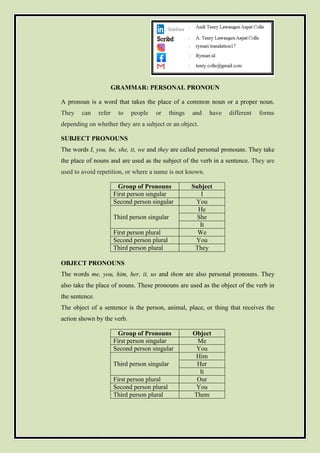
GRAMMAR: PRONOUN
- 1. GRAMMAR: PERSONAL PRONOUN A pronoun is a word that takes the place of a common noun or a proper noun. They can refer to people or things and have different forms depending on whether they are a subject or an object. SUBJECT PRONOUNS The words I, you, he, she, it, we and they are called personal pronouns. They take the place of nouns and are used as the subject of the verb in a sentence. They are used to avoid repetition, or where a name is not known. Group of Pronouns Subject First person singular I Second person singular You Third person singular He She It First person plural We Second person plural You Third person plural They OBJECT PRONOUNS The words me, you, him, her, it, us and them are also personal pronouns. They also take the place of nouns. These pronouns are used as the object of the verb in the sentence. The object of a sentence is the person, animal, place, or thing that receives the action shown by the verb. Group of Pronouns Object First person singular Me Second person singular You Third person singular Him Her It First person plural Our Second person plural You Third person plural Them
- 2. POSSESSIVE PRONOUNS Possessive pronouns can also be used to explain who owns something. Unlike possessive determiners, they replace the noun they are showing possession of. Group of Pronouns Possessive First person singular My Second person singular Your Third person singular His Her Its First person plural Our Second person plural Your Third person plural Their REFLEXIVE PRONOUNS Reflexive pronouns show that the subject of a verb is the same as its object. The words myself, yourself, himself, herself, itself, ourselves, yourselves and themselves are called reflexive pronouns. Group of Pronouns Reflexive Pronouns First person singular Myself Second person singular Yourself Third person singular Himself Herself Itself First person plural Ourselves Second person plural Yourselves Third person plural Themselves Common Mistakes Reflexive Pronouns A reflexive pronoun can only be used if the subject and object of the sentence are the same. If the object is different from the subject, an object pronoun should be used instead. √ My boss invited Joe and me to the meeting. × My boss invited myself and Joe to the meeting
- 3. INDEFINITE PRONOUNS Indefinite pronouns, such as anyone, someone, and everyone are used to refer to a person or object, or a group of people or objects, without explaining who or what they are. ─ Someone and somebody refer to an unspecified person in a positive statement or question. ─ Anyone and anybody refer to an unspecified person in a question or negative statement. ─ Everyone refers to a whole group of people. ─ No one means no person in a group. No one and nobody go in positive statements and questions. Anyone and anybody go in negative statements and questions. ─ Something and anything refer to an unspecified or unnamed object or thing. Something can only be used in questions and positive statements, whereas anything can be used in negative statements as well as questions and positive statements. ─ Nothing means that there are no available objects or things. ─ Everything means all the possible objects or things are available. Where nothing is used in a positive statement, anything can be used in a negative statement with the same meaning. INTERROGATIVE PRONOUNS The words who, whom, whose, what and which are called interrogative pronouns. These pronouns are used to ask questions. DEMONSTRATIVE PRONOUNS The words this, these, that and those are called demonstrative pronouns. They are showing words. You use this and these when you point to things near you. You use that and those when you point to things farther away.
- 4. Demonstrative pronouns can be singular or plural: Singular Plural This these That those REFERENCES AND RECOMMENDED READING Altenberg, E. P., & Vago, R. M. (2010). English grammar: Understanding the Basics. Cambridge University Press. Azar, B. S. (1996). Basic English Grammar. New Jersey: Prentice-Hall Regents. Azar, B. S. (2003). Fundamentals of English Grammar: Chartbook: a Reference Grammar. White Plains, NY: Longman. Azar, B. S., & Hagen, S. A. (2009). Understanding and using English grammar: Workbook. White Plains, N.Y.: Pearson Longman. Ansell, M. (2000). Free English Grammar Second Edition. Barduhn, S., & Hall, D. (2016). English for Everyone–English Grammar Guide. New York: DK Publishing. Herring, P. (2016). Complete English Grammar Rules. California: Createspace Independent Publishing Platform. Murphy, R., Smalzer, W. R., & Nguyễn, T. T. (2000). Grammar in Use: Intermediate. Cambridge: Cambridge University Press. Murphy, R., & Čhakramāt, S. (2002). Essential grammar in use (Vol. 20010). Cambridge: Cambridge University Press.